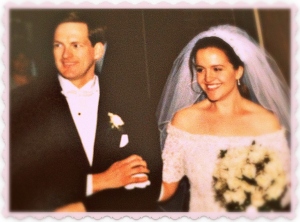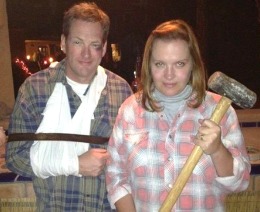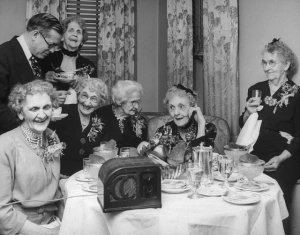Years ago, a neighbor in her fifties who played tennis and kept a nicely appointed home told me a story about her marriage. She had met a young woman she met in an airport, and as they engaged in the regular small talk, the young woman asked my neighbor about her husband. “He travels a lot for work,” my neighbor told her, “but he’s home most weekends.”
“Well,” the young woman said, “that’s not a real marriage, is it?” My neighbor was hurt, so I reacted with the requisite indignation.
“That’s terrible,” I said. But privately, I agreed the assessment. I mean, really.

In my late twenties and newly married, I had created one story about marriage. I was something of an expert— my parents had five marriages between them. My parents’ divorce when I was 5 or 6, its causes and consequences, inoculated me against any idea of divorce as neutral or good (this is my story), against working outside the home, and, considering how I lived after the divorce, distilled my philosophy of child rearing. Calvin Trillin sums it up in About Alice: “Your children are either the center of your life or they’re not, and the rest is commentary.”
A few years ago, during one of the happy reunions Facebook facilitates for middle-aged women, I was sitting with a circle of junior high girlfriends when someone asked me how long I had been married. “Seventeen years,” I said demurely, trying not to sound too smug. No need.
“Ewwww!” my predominately divorced friends rang out in a chorus worthy of the 12-year-olds we once were. Embarrassed, I felt as if I had told a bad joke about dirty underwear that somehow came across as racist. I felt I needed to explain how really very happy we were.
The other night my friend Clare, recently divorced, asked about the book that was by my chair. “Oh, it’s a book by Calvin Trillin, a nice little tribute to his late wife.”
“I can’t read things about great romances right now,” Clare said, “like you and Chris have.” Did she mean it tongue in cheek? I felt the need to explain we were not as romantic and happy as all that.
Longevity in marriage seems to engender one of two assumptions: the couple is either toiling away in pre-divorce misery or is living in some deliriously happy romantic comedy. Both assumptions are accurate. As I am often tempted to write in wedding cards, and sometimes do, The secret to staying married is not getting divorced.
Hence, I am a strident marriage advocate; I like to preach the message. When my husband’s baby brother announced his engagement, I sent a missive, unsolicited, of course:
Please, please, both you and your fiancée need to sit down separately and write individual lists about what, in your own minds, would be grounds for divorce. Then come together and share those lists. . .
In case you were wondering, my husband disapproved (I was interfering) and I never heard back from my brother-in-law.
In her blog, Cold, Victoria Dougherty writes,
With love, the stakes are so huge – especially after love becomes marriage. There is no other relationship. . . that combines all elements of the human experience: ardor, friendship, partnership, sexuality, blood and death.
Ardor, friendship, partnership and sexuality are the promises of diamond commercials. Blood and death are the rest of the story. Even the Catholic Church, an institution known for being quite fond of marriage, warns in the catechism that marriage “. . . has always been threatened by discord, a spirit of domination, infidelity, jealousy, and conflicts that can escalate into hatred and separation” (CCC 1606).
Not long ago I paraphrased this bit of wisdom to a newly engaged couple at a party: “Marriage is really hard.” They both recoiled on the sofa, as if I had accidentally told the racist underwear joke.
“Why do people keep telling us that?!” asked the young man. “We’re really tired of hearing it.” They were both medical students, both bright and beautiful and shocked by the veracity of strangers. Again, I felt embarrassed. Who was I, some housewife who mildly resented all happy people, to sprinkle Eastern European realism on their joy?
A few months later, I heard they had called off the engagement.

There is a gauntlet in the Catholic Church known as Marriage Prep, a sort of group therapy series of meetings where engaged couples are forced to discuss themes outlined in colorful leaflets reminiscent of the Weekly Readers or Scholastic Book order forms from grade school. You know what madly-in-love-young couples should actually be talking about? Blood, death and iceburgs.
A poignant documentary about a complicated marriage, The Stories We Tell, begins with this quote by Margaret Atwood:
“When you are in the middle of a story it isn’t a story at all, but only a confusion; a dark roaring, a blindness, a wreckage of shattered glass and splintered wood; like a house in a whirlwind, or else a boat crushed by the icebergs or swept over the rapids, and all aboard powerless to stop it. It’s only afterwards that it becomes anything like a story at all. When you are telling it, to yourself or to someone else.”
Just within the marriages of my friends and acquaintances— and I am something of a hermit— I have witnessed adultery, financial ruin, mental illness, infertility, the interfering wrath of ex-spouses, seriously ill children, the death of a child, cancer, drug-addiction and a currently homeless teen. Here is powerlessness. Here are iceburgs in all their jagged, crushing forms.
Incidentally, my husband has worked in California for the past two years, commuting home only on weekends. (Did you raise your eyebrows?). And somewhere there is a Miss America factory churning out an endless supply of ever fresher, more vivacious admin assistants. And there is a wickedly intelligent track coach. But I digress.
I would like to recommend three books about marriage: the aforementioned About Alice, Donald Hall’s The Best Day The Worst Day and Olivia Ames Hoblitzelle’s Ten Thousand Joys Ten Thousand Sorrows. These are the final drafts of stories about marriage, told after one of the partners has died. These are beautiful books— for Trillin’s self-deprecating admiration of his late wife, for Hall’s grappling with memory and tragedy and for the painfully intimate glimpse into a couple’s attempts to communicate through the veil of Alzheimers in Ten Thousand Joys.
Perhaps all good books about marriage are a priori posthumous, because only then is the book not also possibly about divorce. The nights when my husband lies sleeping beside me, my breath catches in my chest and my heart aches at the thought that ’til death do us part means that death will part us. But that is the only happy ending to a long marriage, isn’t it?



After 17 years I figure the success of my marriage is due, in large part, to my husband’s ability to put up with me. At least so far! Keep the blog posts coming.. A great read!!
LikeLiked by 1 person
Lovely. I am so happy I got to read this, and so happy that you wrote it. You are right : marriage is hard and divorce sucks. Thank you for sharing this.
LikeLiked by 1 person
Thank you, Sarah.
LikeLike
Thanks. Yes, Ron and I are still married, going to be 43 years this Oct. Loved your words of wisdom. You are correct, looking back after the fact it turns into a story.
LikeLiked by 1 person
Yes, just because something is hard doesn’t mean it’s not good. My parents celebrated their 60th anniversary last week, not very far from the only possible happy ending to their long marriage. I’m not sure that my dad knew for sure what they were celebrating. A few days ago, he asked her in his confusion how she came to be there in the house. She responded in her low-key way, “Out of love, I guess.” My beautiful niece got married last month in a ceremony that was lovely in every way. The pastor didn’t let her and her dashing groom kiss and skip away down the daisy-strewn aisle before charging all those in attendance to commit to supporting and encouraging them all along the way in their marriage. It was a good reminder not to simply set them adrift and hope for the best where there are surely going to be conflicts within and threats from without. One of the best ways to encourage them along the way is to do just what my parents have done–to stay committed and stick with it. (Should I include a disclaimer? I love being married to my husband, and I have for 16 years. Does that mean I don’t know what I’m talking about?)
LikeLiked by 1 person
Marriage is work. If we separated every time things were difficult instead of working through them we wouldn’t be married today. Our 39th anniversary is coming up in 3 weeks. Are we happy? Yes, most of the time. I think one thing that solidifies our relationship is our ability to converse with each other. We tend to think alike but we have great discussions. I don’t understand couples that never seem to be able to carry on conversations with each other. I remember being shocked when a friend told me that her and her husband run out of things to say to each other when they go on dates. Really????
LikeLiked by 2 people
I better not comment. I will say that I am happy not being married anymore. Love your blog my dear sweet cousin!
Mary
LikeLike
Pingback: What to do When Yodeller Dumps You—A Love Story | A Word, Please. . .
Pingback: How I Knew To Choose Him Over All The Others I Might Someday Meet | Thought Catalog
Pingback: How I Chose Him Over All The Men I Hadn’t Met Yet | Thought Catalog
My parents were married just over 30 years when my mom died. Your conclusion rings very true for their marriage. They were so in love, and also so loving, all the way up until the day she died last summer.
And yet they both had ex-spouses.
I’ve been married less than 2 years, and I really feel like my husband & I are lucky enough to have gotten it right on the first try. But if I learned anything from my own parents, it’s that divorce doesn’t make you a failure, nor does it doom your subsequent relationships. Luckily for me, their own history helped me be cautious before entering into a relationship, to make sure I chose my husband as wisely as my parents chose each other.
LikeLike
Thank for reading. Congrats on choosing wisely. 🙂
LikeLike
Pingback: Outraged Revenge Post vs. Empathy – A Word, Please. . .
Pingback: A Word on Crushes and Commitment – A Word, Please. . .